
AIBR-Revista de Antropologia Iberoamericana
Scope & Guideline
Unveiling Cultural Narratives from Ibero-America
Introduction
Aims and Scopes
- Political Anthropology:
The journal frequently addresses themes related to political symbols, power dynamics, and social instability, particularly as they relate to national identity and collective memory. - Engaged Ethnography:
A strong emphasis on community-oriented and engaged ethnography is evident, with a focus on collaborative methodologies that highlight the voices and experiences of marginalized groups. - Cultural Heritage and Identity:
Exploration of cultural heritage, identity formation, and the impacts of globalization and extractivism on indigenous and local communities are central to the journal's discourse. - Gender Studies and Intersectionality:
The journal features a significant number of studies addressing gender dynamics, violence, and the intersection of gender with ethnicity, migration, and socio-economic issues. - Environmental Anthropology:
Recent publications indicate a growing interest in environmental issues, including climate change, human-nonhuman relations, and biocultural models. - Indigenous Studies:
The journal is committed to examining indigenous perspectives, rights, and practices, particularly in relation to contemporary social and political challenges.
Trending and Emerging
- Digital Anthropology:
There is a growing focus on the intersection of digital technology and anthropology, particularly in how social media and online platforms shape cultural narratives and identities. - Climate Change and Environmental Justice:
Emerging themes surrounding climate change and environmental justice highlight the role of anthropology in addressing urgent global issues, particularly those affecting vulnerable communities. - Health and Medical Anthropology:
Recent publications emphasize health-related topics, particularly in the context of the COVID-19 pandemic, exploring the socio-cultural implications of health crises and medical practices. - Transnational Migration and Mobility:
The journal increasingly addresses themes of migration, focusing on the experiences of migrants and the socio-political implications of transnational mobility. - Feminist and Queer Anthropology:
There is an upward trend in studies that engage with feminist and queer theories, exploring gender identities, sexualities, and their intersections with culture and politics. - Collaborative and Participatory Research:
The emergence of collaborative and participatory research methodologies reflects a commitment to inclusive scholarship that prioritizes community engagement and co-production of knowledge.
Declining or Waning
- Traditional Anthropological Methods:
There is a noticeable decrease in papers utilizing conventional anthropological methods without integrating newer, participatory approaches. This may reflect a shift towards more dynamic and engaged methodologies. - Universalist Theories:
Themes centered around universalist anthropological theories are less prevalent, possibly indicating a shift towards localized and context-specific studies that prioritize unique cultural narratives. - Historical Anthropology:
While historical perspectives are still relevant, there has been a reduction in studies focusing solely on historical anthropology without connecting to contemporary issues or methodologies. - Anthropology of Religion:
The exploration of religious practices and beliefs appears to be waning, with fewer studies addressing spirituality or religious dynamics within contemporary contexts. - Urban Anthropology:
Although urban studies remain important, there seems to be a decline in ethnographies focusing on urban settings, potentially due to shifting interests towards rural and indigenous community studies.
Similar Journals
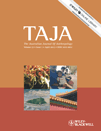
Australian Journal of Anthropology
Innovative Insights, Engaging DiscoursesThe Australian Journal of Anthropology, published by Wiley, stands as a pivotal resource in the field of anthropology, reflecting a deep commitment to advancing scholarly discourse since its inception in 1990. With an ISSN of 1035-8811 and E-ISSN 1757-6547, this journal provides a platform for innovative research and critical analysis, contributing to the global anthropology community. Based in the United States, at 111 River St, Hoboken, NJ, it has established itself in the Q3 category of anthropology journals, ranking #162 out of 502 in Scopus, placing it in the 67th percentile among its peers. While it is not currently an open-access publication, the journal remains dedicated to accessibility through institutional subscriptions and provides a wealth of insight into anthropological methods and cultural studies. It seeks to foster interdisciplinary dialogue and promote a comprehensive understanding of social dynamics, making it an essential read for researchers, professionals, and students eager to enrich their knowledge and engage with contemporary anthropological issues.
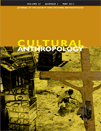
CULTURAL ANTHROPOLOGY
Bridging Perspectives Across CulturesCULTURAL ANTHROPOLOGY is a premier journal in the field of anthropology, published by the esteemed SOC CULTURAL ANTHROPOLOGY. With an impressive impact factor and ranking in the Q1 category for both anthropology and arts and humanities, it stands as a leading platform for scholarly discourse and innovative research. Since transitioning to Open Access in 2014, the journal has made substantial contributions to the accessibility of anthropology literature, allowing a broader audience to engage with cutting-edge anthropological insights and findings. The journal's scope encompasses a wide range of cultural studies and anthropological perspectives, catering to a diverse readership that includes researchers, professionals, and students. Published from the Department of Anthropology, Rice University in Houston, Texas, CULTURAL ANTHROPOLOGY continues to shape the conversation in its field, promoting interdisciplinary dialogue and enriching the academic landscape.

Laboratorium-Russian Review of Social Research
Fostering Critical Discussions in Social SciencesLaboratorium - Russian Review of Social Research, published by the Institute of European Russian and Eurasian Studies, is a pivotal journal that delves into the complexities of social phenomena within the Russian and Eurasian context. With its ISSN 2076-8214 and E-ISSN 2078-1938, this journal has been recognized for its significant contributions to anthropology, cultural studies, gender studies, sociology, and political science, earning a Category Quartile Q2 ranking in Anthropology and Cultural Studies in 2023. The journal provides a platform for innovative research and critical discussions that shed light on the social dynamics influencing the region, making it an essential resource for researchers, professionals, and students. Its open access approach ensures that knowledge is freely accessible, fostering a collaborative academic community. With a converged publication timeline from 2018 to 2024, Laboratorium is committed to advancing understanding and facilitating discourse in the rapidly evolving fields it covers, positioning itself as a significant player in social sciences research.
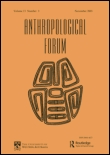
Anthropological Forum
Pioneering Insights into Contemporary Anthropological IssuesAnthropological Forum, an esteemed journal in the field of anthropology, is published by Routledge Journals, Taylor & Francis Ltd. With an ISSN of 0066-4677 and an E-ISSN of 1469-2902, the journal has cemented its reputation for fostering critical discussions and innovative research since its inception in 1963. Covering a broad range of topics within anthropology, it has achieved an impressive Q1 ranking in the category of Anthropology and a Q2 ranking in Arts and Humanities (miscellaneous) in 2023, showcasing its pivotal role in advancing scholarly discourse. With a Scopus ranking placing it in the top 10% of its field, the journal provides valuable insights into contemporary anthropological issues, making it an essential resource for researchers, professionals, and students alike. Although not an open-access journal, the comprehensive studies and articles published within its pages contribute significantly to the academic and professional community. Addressed out of Milton Park, Abingdon, UK, the Anthropological Forum remains a seminal platform for disseminating high-quality anthropological research.

Social Analysis
Innovating Dialogue Across DisciplinesSocial Analysis, an esteemed academic journal published by BERGHAHN JOURNALS, is at the forefront of interdisciplinary research, focusing on the dynamic intersections of anthropology, cultural studies, sociology, and the arts and humanities. Since its inception in 2002 and having transitioned to an Open Access model in 2020, the journal ensures that critical social research is widely accessible to scholars and the public alike. With an impressive Q1 ranking in Anthropology and cultural studies and holding a notable Q2 in Sociology and Political Science, it garners attention from a large academic audience, as evidenced by its high Scopus rankings: 10th in general arts and humanities and 153rd in cultural studies. This signifies its influential role in shaping contemporary discourse and providing a platform for innovative ideas and methodologies in understanding social phenomena. Based in Brooklyn, NY, the journal is dedicated to fostering scholarly dialogue and advancing the field, making it an essential resource for researchers, professionals, and students eager to engage with and contribute to the field of social analysis.
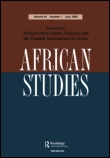
AFRICAN STUDIES
Fostering Intellectual Engagement in African StudiesAFRICAN STUDIES, published by Routledge Journals, Taylor & Francis Ltd, is a leading academic journal that has been at the forefront of African research since its inception in 1942. With an impressive convergence of interdisciplinary insights covering Anthropology, Cultural Studies, History, and Political Science, this journal serves as an essential resource for scholars and practitioners alike. It boasts a notable impact within its field, ranking in the Q1 quartile for Cultural Studies and History and achieving a commendable Q2 for Anthropology, and Political Science and International Relations according to the 2023 category quartiles. Researchers can benefit from the journal's rigorous peer-review process, which ensures high-quality and impactful research dissemination. While it is not an open-access journal, it offers various subscription options for accessing its wealth of scholarly articles. With a commitment to advancing understanding of African contexts and perspectives, AFRICAN STUDIES plays a crucial role in shaping contemporary debates and fostering intellectual engagement within the academic community.

Revista Espanola de Antropologia Americana
Advancing Knowledge in Cultural StudiesRevista Española de Antropología Americana, published by UNIV COMPLUTENSE MADRID, SERVICIO PUBLICACIONES, stands as a significant contribution to the field of anthropology, particularly focusing on American societies and cultures. Since its inception in 1970, this journal has evolved, with issues currently being published until 2024, providing a platform for original research, reviews, and scholarly discourse. Despite being a Q3 category journal in the 2023 rankings, it plays a pivotal role in disseminating knowledge and stimulating academic debate within the anthropology community. With an ISSN of 0556-6533 and an E-ISSN of 1988-2718, Revista Española de Antropología Americana strives to engage researchers, professionals, and students with insightful content that reflects the dynamic nature of cultural studies. Although it operates under traditional access models, the rich array of topics covered ensures its relevance to ongoing scholarly conversation in social sciences and anthropology. Addressing a diverse array of anthropological themes, this journal is essential for anyone looking to deepen their understanding of the cultural frameworks shaping American societies.
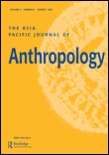
Asia Pacific Journal of Anthropology
Advancing Knowledge in Anthropology and Cultural StudiesAsia Pacific Journal of Anthropology is a premier academic journal dedicated to advancing the field of anthropology and cultural studies, published by Routledge Journals, Taylor & Francis Ltd. With an ISSN of 1444-2213 and E-ISSN 1740-9314, this journal has gained recognition for its rigorous scholarly contributions since its inception in 2000. Situated in the UK, it is strategically positioned to serve as a vital resource for researchers, professionals, and students exploring the rich complexities of human societies and cultures within the Asia Pacific region and beyond. As evidenced by its Q2 ranking in both anthropology and cultural studies for 2023, alongside its impressive Scopus ranks—#218 among 1304 in Cultural Studies and #157 among 502 in Anthropology—this journal illustrates a strong commitment to delivering high-quality, impactful research. While it is not an open-access journal, it remains a key platform for disseminating innovative research and fostering academic dialogue, thereby significantly contributing to the advancement of knowledge in the social sciences.
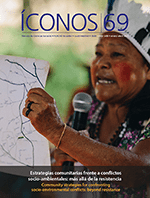
Iconos
Exploring Socio-Cultural Dynamics Through Rigorous ScholarshipIconos is a distinguished academic journal published by FAC LATINOAMERICANA CIENCIAS SOCIALES-FLACSO in Ecuador, with an ISSN of 1390-1249 and an E-ISSN of 1390-8065. Since its inception in 1997, Iconos has proudly maintained an open-access policy, promoting accessibility and dissemination of critical research across various disciplines. With a strong focus on Anthropology, Gender Studies, and Social Sciences, this journal has achieved a commendable standing, being categorized in the Q2 quartile in 2023 across multiple categories in these fields. Notably, it ranks #199 in Anthropology and #91 in Gender Studies, placing it in the upper percentiles of academic publishing. The journal aims to foster interdisciplinary dialogue and to illuminate socio-cultural dynamics through rigorous scholarship. With its commitment to quality, research diversity, and social relevance, Iconos serves as an essential resource for researchers, professionals, and students alike, seeking to engage with contemporary social issues from a Latin American perspective.
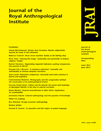
JOURNAL OF THE ROYAL ANTHROPOLOGICAL INSTITUTE
Illuminating the Rich Tapestry of HumanityJOURNAL OF THE ROYAL ANTHROPOLOGICAL INSTITUTE, published by Wiley, stands as a prestigious platform for scholarly discourse in the field of anthropology. With an ISSN of 1359-0987 and an E-ISSN of 1467-9655, this journal has been a vital resource for researchers, professionals, and students since its inception, featuring contributions that push the boundaries of understanding in both cultural and social anthropology. The journal’s rigorous peer-review process affirms its high academic standards, reflected in its top-tier Q1 rankings in both the Anthropology and Arts and Humanities categories for 2023. With a current ranking of #78 out of 502 in Social Sciences Anthropology and #138 out of 552 in Miscellaneous Arts and Humanities, it inhabits a critical space within academia, addressing seminal issues and innovative research. While the journal is not open access, it remains accessible to those affiliated with institutions that provide subscriptions, ensuring that groundbreaking anthropological insights are disseminated widely within the academic community. As it converges from 1995 to the present, the JOURNAL OF THE ROYAL ANTHROPOLOGICAL INSTITUTE continues to shape the landscape of anthropological research, engaging a diverse readership eager to explore the intricate tapestry of human cultures.